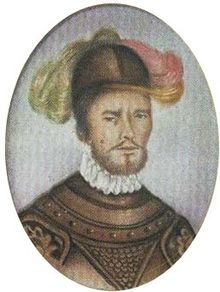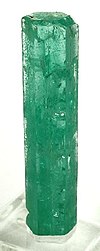Pedro de Ursúa
Pedro de Ursúa | |
|---|---|
 Pedro de Ursúa | |
| Born | 1526 |
| Died | 1561 |
| Cause of death | Murder |
| Nationality | Navarre |
| Occupation | Conquistador |
| Years active | 1545–1561 |
| Employer | Spanish Crown |
| Known for | Co-founder of Pamplona Failed conquest of the Muzo Quest for El Dorado |
Pedro de Ursúa (1526 – 1561) was a Spanish conquistador from Baztan in Navarre.[1][2] He is best known for his final trip with Lope de Aguirre in search for El Dorado, where he found death in a plot.
He was born in Arizkun, Baztan, to a Beaumont family who supported the Spanish occupation of Navarre, benefiting directly from the Navarrese loyalist defeat at Amaiur in July 1522.
In Panama, Ursúa subdued a Cimarron (ex-slave) revolt by tricking Cimarron leader Bayano into coming unprepared to negotiate a truce. He then captured Bayano and sent him back to King Philip II of Spain. Together with Ortún Velázquez de Velasco, Pedro de Ursúa founded the city of Pamplona, New Kingdom of Granada, on November 1, 1549.[3]
Ursúa later searched the Amazon region for El Dorado with Lope de Aguirre. When Ursúa would not allow Aguirre's mistress on the expedition, Aguirre conspired with another officer, Fernando de Guzman, to use this rejection as a pretext to start a riot in which they assassinated Ursúa and seized power.[4]
Pedro de Ursúa in fiction
A fictional version of Ursúa and Aguirre's story is depicted in the Werner Herzog film, Aguirre, der Zorn Gottes and in the Carlos Saura film El Dorado.
The novel Ursúa by William Ospina has become one of the main references concerning Pedro de Ursúa. The book provides details about the life of Ursúa and makes a general account of the events happening in the New World during the mid 16th century.
Gallery
See also
References
- ^ William A. Douglass; Jon Bilbao (2005). Amerikanuak: Basques in the New World. University of Nevada Press. p. 84. ISBN 978-0-87417-625-4.
- ^ Elena Mampel González; Neus Escandell Tur (1981). Lope de Aguirre: Crónicas, 1559-1561. Edicions Universitat Barcelona. p. 15. ISBN 978-84-85411-51-1.
- ^ (in Spanish) Official website Pamplona
- ^ Descendants of Juan de Ursúa
Further reading
External links
- Translation of Illustrated Encyclopedia of the Basque Country article on Lope de Aguirre - contains large segment on Ursúa's Dorado expedition
- (in Spanish) Pedro de Ursua at Artehistora.com
- (in Spanish) El Asesinato de Pedro de Ursua
- Aguirre, der Zorn Gottes at IMDb


